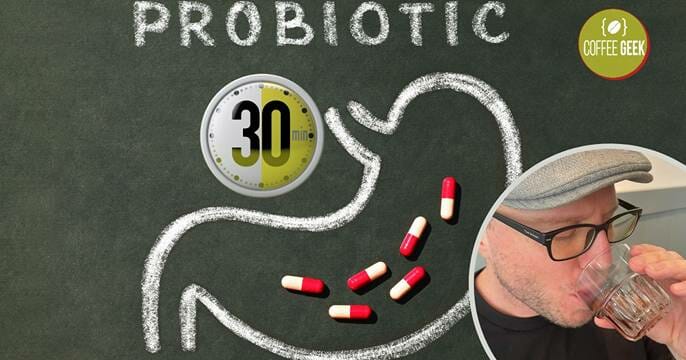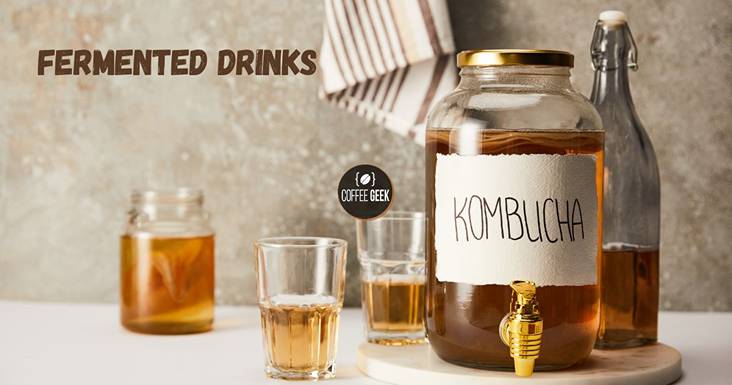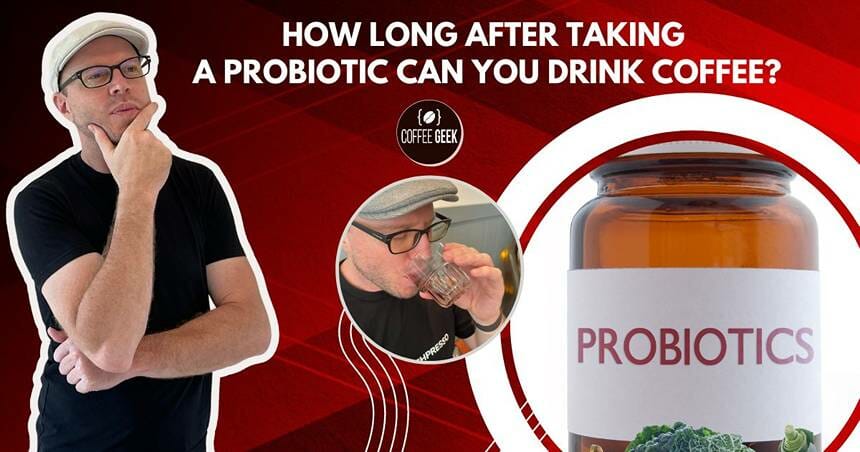Many people take probiotics to support their gut health, but navigating when to take them and how they interact with everyday drinks like coffee can be confusing. How long after taking a probiotic can you drink coffee?
If you’re a coffee enthusiast and also incorporate probiotics into your daily routine, you might be wondering how long after taking a probiotic should you wait before enjoying your cup of coffee.
Understanding the relationship between probiotics and coffee helps ensure you are maximizing the benefits of both.

Probiotics are live bacteria and yeasts that help support your gut health, but certain food and beverages might affect their effectiveness.
Coffee is known to be a popular morning drink, and people often consume it alongside or shortly after taking probiotics.
Although the scientific opinions vary, the general consensus is to wait at least 30 minutes after taking a probiotic before drinking your cup of coffee, allowing the supplement to settle and start working in your gut.
Key Takeaways
- Wait at least 30 minutes after taking a probiotic before enjoying your coffee.
- The effectiveness of probiotics can potentially be affected by coffee consumption.
- Consider alternative beverage options or time your probiotic intake to maximize effectiveness.
- Understanding Probiotic Supplements and Coffee
- How Coffee Can Affect Probiotic Effectiveness
- Timing Your Probiotic Intake and Coffee Consumption – How Long After Taking a Probiotic Can You Drink Coffee?
- Alternative Beverage Options
- The Importance of a Balanced Diet and Lifestyle
- Frequently Asked Questions
Understanding Probiotic Supplements and Coffee
Probiotics Basics
Probiotics are live microorganisms that can provide positive benefits to keep your gut healthy. They help balance the good and bad bacteria in your digestive system.
Including probiotics in your diet can improve your digestive health, boost your immune system, and enhance overall well-being.

Coffee’s Effects on the Body
Coffee is a popular beverage known for its energizing effects, primarily due to its caffeine content. However, coffee can also have some influences on your digestive system.
For instance, coffee may stimulate bowel movements, and it can also produce an acidic environment in the stomach.
Now, you might wonder how coffee affects the consumption of probiotics.

While some sources suggest waiting at least 30 minutes after taking a probiotic before enjoying your cup of coffee, others state that you don’t need to worry about taking probiotics and drinking coffee simultaneously.
Just remember that it is generally a good idea to take probiotics with a sip of water instead of a hot beverage.
Hot temperatures can potentially harm the probiotic supplement bacteria before they reach your gut.
In summary, maintaining a balance between your coffee intake and probiotic consumption can help promote optimal gut health.
Paying attention to the timing of your intake and the temperature of your beverages can make a difference in reaping the benefits of both probiotics and coffee.
How Coffee Can Affect Probiotic Effectiveness
Temperature and Probiotics
While enjoying your morning coffee, be mindful of the temperature. Drinking coffee hot immediately after taking probiotics may affect the viability of the good bacteria.
High temperatures can harm these delicate microorganisms and potentially reduce their effectiveness.
To give the probiotic supplements a better chance to reach your gut, it’s advised to wait at least 30 minutes after taking them before indulging in a hot beverage.
Consider swallowing your probiotic supplement with a sip of water to help protect them from heat.

Acidity and Iron Absorption
Coffee has a low pH, which means it’s acidic. This acidity might interfere with the probiotics’ survival during their journey through your gastrointestinal tract.
Additionally, the tannins in coffee can bind to iron and other micronutrients, potentially reducing their absorption by your body.
These factors can be especially concerning if you have issues with iron uptake or low stomach acid.
To get the most out of your probiotic supplements, be conscious of when you drink coffee in relation to taking the supplement.
Strive to maintain a friendly environment for the live cultures, allowing them to thrive and provide their numerous health benefits.
Remember, balance is key; moderate coffee consumption can also have positive effects on your healthy gut microbiome.
One study found that people who drank two or more cups of coffee daily had better gut microbiome profiles than those who drank less or none at all.
Enjoy your coffee, but always give your probiotics the optimal environment to work their magic.
Timing Your Probiotic Intake and Coffee Consumption – How Long After Taking a Probiotic Can You Drink Coffee?
Taking Probiotics with Food
To get the most out of your probiotic supplement, it’s crucial to time it right with your food intake. Taking probiotics on an empty stomach ensures they reach the small intestine faster.

However, if you’re not comfortable taking them without food, you can still take them alongside a meal. Just make sure to wait 2-3 hours after a meal before taking your probiotic supplements.
This helps to optimize the probiotics’ effectiveness, similar to taking it on an empty stomach.
Coffee in the Morning vs. Night
Considering your morning routine, you might wonder how long after taking a probiotic can you drink coffee.
According to nutritionist Rob Hobson, it’s wise to wait at least 30 minutes after consuming your probiotic before enjoying your coffee.
This pause allows the probiotics to settle in your stomach and avoid being deactivated by hot liquids.
If you’re a night owl and prefer having coffee later in the day, the same recommendation applies.
Giving your probiotics that 30-minute window can help ensure their effectiveness, regardless of the time you drink coffee.

However, remember that caffeine in the evening or night can affect your sleep quality, so it’s essential to consider this aspect too.
When it comes to other hot beverages like tea, the same principle applies – wait 30 minutes after taking your probiotic supplement before indulging in your favorite hot drink.
In conclusion, being mindful of when you take your probiotics and when you consume hot beverages like coffee and tea will help maximize the benefits of both the supplement and your beverage of choice.
By following these simple timing guidelines, you can enjoy a healthy gut and a satisfying cup of coffee or tea.
| Time After Taking Probiotic | Coffee Consumption Recommendations |
|---|---|
| Immediately | Some individuals may tolerate coffee without issues. |
| 30 minutes to 1 hour | Wait at least 30 minutes to an hour after taking a probiotic. |
| 2-3 hours | Consider waiting 2-3 hours after taking a probiotic to ensure minimal interaction. |
| 4 hours or longer | Waiting for a more extended period may provide better separation between probiotics and coffee, reducing any potential interaction. |
| Individual Variation | Tolerance varies among individuals, so pay attention to how your body responds. Some people may be more sensitive, while others may have no issues. |
| Consult a Healthcare Professional | If you have specific concerns or health conditions, consult with a healthcare professional for personalized advice. |
Alternative Beverage Options
Probiotic Coffee Options
If you’re looking for a probiotic-friendly coffee option, you may want to consider cold coffee or iced bottled coffee.
It is recommended to wait at least 30 minutes after taking a probiotic before drinking coffee to avoid reducing the effectiveness of the probiotics.
Health Benefits of Tea
Alternatively, you might consider incorporating tea into your routine. Tea is a fantastic hot drink that provide health benefits.
Swapping out your regular coffee for a cup of tea could provide positive health effects, such as:
- Antioxidant-rich compounds, which fight free radicals in your body
- Polyphenols, which provide anti-inflammatory properties
- Flavonoids, which help protect your heart health
Fermented Drinks

Fermented drinks like kombucha and kefir can also be a great alternative to coffee, especially when taking probiotics. These drinks are packed with gut-friendly healthy bacteria that promote good health.
Kombucha, a fermented tea drink, is full of probiotics and can be a tasty substitution for beer or other alcoholic drinks. This beverage can be quite flavorful, making it a fun drink choice.
Kefir is another fermented drink option, made from milk or water and full of healthy probiotics. It is often compared to yogurt, but it has a thinner consistency that makes it drinkable.
The probiotic supplement content of kefir helps to keep your gut healthy, the immune system and improves digestion.
The Importance of a Balanced Diet and Lifestyle
Gut Health and Overall Well-Being
A well-rounded and balanced diet is vital for maintaining a healthy gut. Your gut microbiota, or the collection of beneficial bacteria in your system digestive, plays a crucial role in your overall health.
These beneficial bacteria help to support your immune system, reduce inflammation, and promote a healthy digestive system.
To keep your gut flora balanced, in harmony, make sure to incorporate a variety of nutritious foods into your daily meals.
Some key elements to include in your diet are whole grains, high-fiber fruits and vegetables, lean proteins, and healthy fats.
By doing so, you’re providing your beneficial bacteria with an environment that promotes their growth and supports your gut flora well-being.
Incorporating a Probiotic Supplement
Adding a probiotic supplement to your routine can also help promote gut health. Probiotics contain live microorganisms that, when taken in proper amounts, can contribute to the balance of your gut microbiota.
They offer numerous benefits for your digestive system, immunity, and overall wellness.
When considering a probiotic, it’s essential to select one that is appropriate for your specific needs.
Keep in mind that not all probiotics are created equal – they contain different probiotic strains that can have varying effects on your gut bacteria and immune system.
So, make sure to do your research and choose a reputable supplement that aligns with your health goals.
While taking your new probiotic, it’s crucial to be mindful of when and how to consume it.
For example, integrating your supplement into your morning routine and waiting a little before drinking coffee can maximize its effectiveness.
In conclusion, a balanced diet and lifestyle, coupled with the right high quality probiotic supplement, can help support gut health, improve immunity, and contribute to your overall well-being.
Remember to always consult with a healthcare professional when considering adding new supplements to your routine.
Frequently Asked Questions
How long should I wait to have a hot drink after taking probiotics?
It is generally advised to wait at least 30 minutes after taking probiotic supplements before having a hot drink like coffee.
This allows the probiotic to settle in your stomach and reduces the chance of the hot liquid affecting the live bacteria.
What are the signs that probiotics are working?
After taking probiotics for 2 to 3 weeks, you may begin to notice improvements in your gut health.
Some possible signs that probiotics are working include reduced bloating, better digestion, and improved bowel movements.
It’s important to remember that the effects of probiotics can vary between individuals.
Should I take probiotics with food or on an empty stomach?
The best time to take probiotics depends on the specific strain and product.
Some probiotics are recommended to be taken with food, while others may be more effective on an empty stomach.
Always follow the instructions on the label and consult your healthcare provider if you have any concerns.
How much water should I drink with probiotics?
There is no specific amount of water that you need to drink with probiotics.
However, it is recommended to stay hydrated throughout the day to support overall digestive health.
Drinking water can also help with the absorption of the probiotics and make it easier for them to reach your gut.
Can I have alcohol after taking a probiotic?
There is limited research on the effects of alcohol on probiotics.
However, it is best to be cautious and avoid consuming alcohol soon after taking a probiotic, as alcohol may negatively affect the balance of gut bacteria.
Always consult your healthcare provider for personalized recommendations.
Does coffee affect the efficiency of probiotics in food products like yogurt?
There is no strong evidence to suggest that coffee has a significant impact on the efficiency of probiotics in foods like yogurt.
However, it can be helpful to separate your consumption of caffeinated beverages from probiotic-rich foods by at least 30 minutes to ensure the best absorption and effectiveness of the live bacteria.

